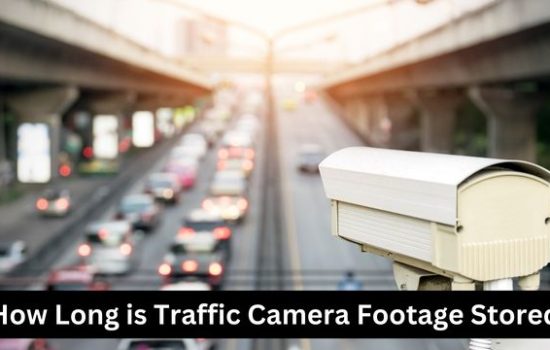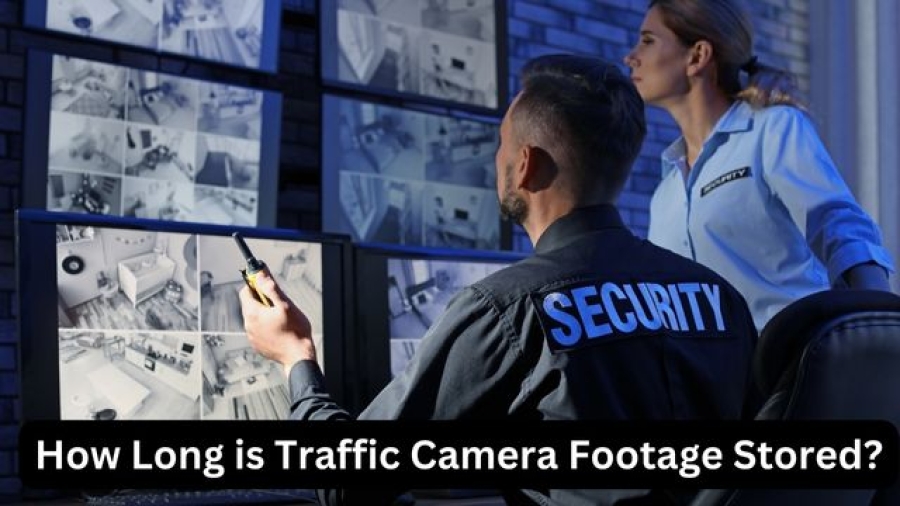Ever witnessed a traffic event and needed the footage? Knowing how long traffic camera footage is stored is vital. This guide will uncover the truth behind the retention period of traffic camera videos.
How Long Is Traffic Camera Footage Stored
Traffic camera footage is typically stored for a period ranging from 30 to 90 days, depending on local regulations and storage capacity. This timeframe allows authorities to review footage in case of accidents, traffic violations, or other incidents on the road.
However, some systems may be set up to store footage for longer periods if needed for investigations or legal purposes. Regular deletion of old footage helps manage storage costs and ensures that only relevant data is retained.
Read More:
Can Security Cameras See Inside Cars
Traffic Camera Systems: An In-Depth Look
Traffic camera systems play a vital role in modern transportation networks. Let’s delve into their functionalities, legalities, and prospects.

- Overview and Purpose:
Traffic camera systems consist of strategically placed video cameras that monitor traffic flow, identify incidents, and enforce traffic laws. They provide real-time data for:
- Traffic management: Optimizing traffic light timing, detecting congestion, and rerouting traffic during emergencies.
- Accident response: Faster dispatch of emergency services by providing immediate visual assessment of accidents.
- Traffic enforcement: Identifying vehicles violating traffic laws like speeding, red light running, or illegal lane changes.
- Legal Considerations and Privacy Concerns:
The storage of traffic camera footage raises legal and privacy concerns. Data retention policies and access regulations vary by jurisdiction. Here are some key considerations:
- Data protection laws: Compliance with regional data privacy laws like GDPR (Europe) or CCPA (California) is crucial.
- Authorized access: Clear guidelines govern who can access footage (law enforcement, transportation agencies) and for what purposes.
- Retention periods: Defined timeframes for storing footage before deletion to balance security needs with privacy concerns.
- Types of Traffic Cameras:
Traffic cameras come in various configurations with distinct recording capabilities:
- High-definition (HD) cameras: Capture clear visuals for license plate recognition (LPR) and detailed incident analysis.
- Speed detection cameras: Use radar technology alongside video to identify speeding vehicles.
- Traffic monitoring cameras: Provide general traffic flow information without focusing on specific vehicles.
- 360-degree panoramic cameras: Offer a wider field of view for comprehensive intersection monitoring.
- Storage Capacity and Technology:
The storage needs for traffic camera footage can be significant. Here’s what factors influence storage:
- Resolution and frame rate: Higher resolution and frame rates require more storage space.
- Number of cameras: Extensive camera networks demand substantial storage solutions.
- Storage technology: Solid-state drives (SSDs) offer faster retrieval but may be costlier than traditional hard disk drives (HDDs) for long-term storage.
- Retention Periods for Traffic Camera Footage:
Retention periods differ based on local regulations and the purpose of the footage. Common durations include:
- Short-term: A few days for general traffic monitoring.
- Medium-term: Weeks or months for potential traffic violation investigations.
- Long-term: In specific cases, footage may be retained for a year or more for serious traffic accidents or criminal investigations.
- Factors Influencing Storage Duration:
Several factors can influence how long footage is stored:
- Severity of incident: Serious accidents or crimes might warrant longer retention.
- Ongoing investigations: Relevant footage might be held until investigations conclude.
- Data privacy regulations: Laws may mandate deletion after a specific timeframe.
- Accessing Traffic Camera Footage:
Obtaining traffic camera footage typically involves a formal request process:
- Law enforcement: Can request footage for investigations with a warrant or subpoena.
- Individuals: May be able to request footage of their vehicle incidents, following specific procedures set by the governing agency.
- Security and Integrity of Stored Footage:
Ensuring the security and integrity of traffic camera footage is critical:
- Encryption: Protecting footage at rest and in transit with robust encryption methods.
- Access controls: Implementing strong access control measures to restrict unauthorized access.
- Audit logs: Maintaining detailed logs of who accessed the footage and for what purpose.
- Future Developments:
Traffic camera technology and data retention practices are constantly evolving:
- Artificial intelligence (AI): AI-powered analytics can automate traffic violation detection and improve incident identification.
- Cloud storage: Cloud-based storage solutions may offer scalability and cost-effectiveness for managing vast amounts of footage.
- Data anonymization: Techniques to anonymize footage while preserving relevant details for traffic management purposes might be implemented.
By understanding these aspects of traffic camera systems, we can ensure they effectively serve their purpose while respecting privacy concerns and legal requirements.
Read Also:
How to Get Intersection Camera Footage?
Understanding Traffic Camera Footage
Traffic cameras are our eye in the sky. They keep roads safe and monitor traffic flow.
Why Is Traffic Camera Footage Important?
- It helps manage traffic.
- It keeps drivers safe.
- It can solve legal issues.
Storage Duration for Traffic Camera Footage
Different places store traffic camera footage for different times.
| Location | Storage Duration | Reason for the Duration |
|---|---|---|
| Your City | 7-30 days | City laws decide this time. |
| Your State | Up to 90 days | The state’s rules decide this time. |
| Private Areas | 15-90 days | Owners decide this time. |
Factors Affecting the Storage Duration
Let us look at what can change how long the footage is kept.
- Local Laws: Every place has its own rules.
- Storage Space: More space, longer storage.
- Camera Type: Some cameras overwrite old footage.
How To Request Traffic Camera Footage
Need traffic camera videos? Follow these steps:
- Find out who owns the camera.
- Write a formal request.
- Give all the details of the event.
- Wait for a response.
Extending Traffic Camera Footage Storage
Sometimes, it’s important to keep footage longer. Here’s how it can be done:
- Upgrade Storage: Get more digital space.
- Cloud Storage: Store footage online.
- Legal Holds: If there’s a case, footage can be saved.
Get Informed, Stay Safe
Now you know more about traffic camera footage storage. Time limits vary, so always ask your local department.
Got a question? Reach out to your local traffic authority. Do not wait long to get the evidence you may need! This HTML document gives a comprehensive guide for understanding the storage durations of traffic camera footage and how it applies to different scenarios.
This information is presented using simple language and a clear structure for easy comprehension. Lists, tables, and headings are utilized to enhance readability and provide quick access to key points, catering to a younger audience while still being suitable and informative for any reader seeking this information.
Don’t Miss:
How to Access Traffic Camera Footage?
How to Get Traffic Camera Footage? See Full Guidelines
How to Get Street Camera Footage?
Frequently Asked Questions
Can I View Traffic Camera Footage Online?
Yes, but not all. Check your local traffic website.
Is Traffic Camera Footage Public Record?
Mostly yes, but it depends on the location’s laws.
How Can I Use Traffic Camera Footage In Court?
Ask a lawyer to help. They can get the videos as evidence.
How Long Do Traffic Cameras Keep Footage?
Traffic camera footage is typically retained from 24 to 90 days depending on the municipal regulations and storage capacity.
Is Traffic Camera Video Footage Publicly Accessible?
The availability of traffic camera video to the public varies by jurisdiction but often requires a formal request or subpoena.
Can I Request Traffic Camera Footage?
Individuals can request traffic camera footage by following the legal process and requirements set by the local traffic authorities.
What Happens To Old Traffic Camera Footage?
Old traffic camera footage is generally overwritten or deleted after the storage period defined by pertinent authorities expires.
Do All Traffic Cameras Record Video?
Not all traffic cameras record video; some are designed solely for real-time monitoring or to capture still images.
Does Traffic Camera Footage Help In Accidents?
Yes, traffic camera footage can be instrumental in accident investigations, providing evidence for legal and insurance purposes.
Conclusion
Knowing how long traffic camera footage is kept is a big help. It can be for safety or legal matters.
Remember, check with local authorities for the correct period. Be sure to act fast to get the footage you need.
